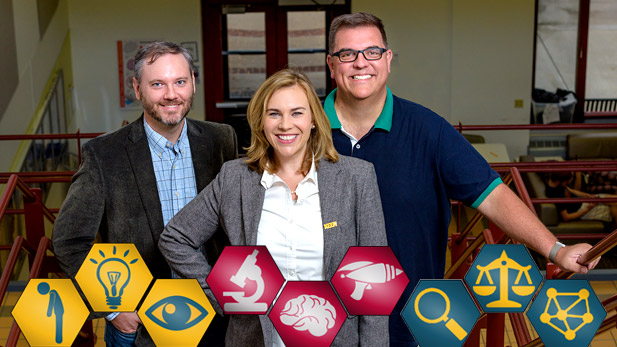Credential Program Helping Students Tell Their Academic Stories

Faculty leading the pilot credentials program are (from left) David Henthorn, associate professor of chemical engineering; Rebecca DeVasher, associate professor chemistry and biochemistry; and Ross Weatherman, professor of chemistry and biochemistry.
What are those attributes that give engineers, scientists and mathematicians an entrepreneurial mindset–exercising curiosity, making connections and creating value in their daily lives, workplaces and communities throughout the world?
Is it being a visionary? Is it being an observer? Is it being a networker?
The highlighted traits are among nine behavioral characteristics that students gain in classroom and in extracurricular activities that are being highlighted on campus this school year with credential badges, in a national pilot program through the Kern Entrepreneurial Engineering Network (KEEN). The 31-college organization includes such institutions as Georgia Tech, Arizona State, Ohio State and Baylor.
“We’re helping students tell and document the story of their undergraduate careers,” says Anne Houtman, the institute’s provost and chief academic administrator. “Our students, on many occasions, have difficulty putting into words those invaluable skills that are challenging to quantify.”
Yes, there’s more to gauging the student experience than a grade-point average, adds Rebecca DeVasher, associate professor of chemistry and biochemistry. She has joined with colleagues David Henthorn, associate professor of chemical engineering, and Ross Weatherman, professor of chemistry and biochemistry, in working with KEEN officials and educators at other KEEN partner institutions over the past two years on developing the credentialing program. It is seen as a trailblazing initiative in engineering education.
“This credentials program, as we have helped develop, provides the perfect educational platform to match with Rose-Hulman’s mission of providing our students with unique experiences and opportunities. It’s a valuable tool that should be the wave of the future in STEM education,” DeVasher says.
For instance, Henthorn serves as faculty adviser of the institute’s Chem-E-Car student competition team. While developing a vehicle each year, students from a variety of academic majors learn to be a visionary, discoverer, observer, brainstormer, detective, mitigator and networker. Persisting through and learning from failure–The Epic Fail—is a significant learning experience gained in all competition teams, according to Henthorn.
“Whenever any of these skills are gained—in the classroom and laboratory or during the course of a student competition—a faculty member can file a letter of recommendation (with each institution’s credentialing team) for a student to earn a credential,” says Weatherman. Electronic badges are then awarded by a special credentialing course in the Moodle learning platform, and can be featured in a student’s electronic portfolio or LinkedIn profile that can be viewed by prospective employers and graduate school admission offices.
“There has been enthusiastic support from other STEM educators, students and employers. Now, we’re putting things into practice. If it’s going to succeed, it’s going to be at Rose-Hulman,” she states.
Badges Identify Students with Entrepreneurial-Minded Attributes
The following credentials seek to recognize and endorse student achievement in entrepreneurial-minded learning in traditional coursework and co- and extracurricular activities.
CREATING VALUE BADGES
The Visionary: Recognizes opportunities to create extraordinary value ahead of the crowd.
The Discoverer: Finds opportunities to create extraordinary value in unexpected circumstances.
The Epic Fail: Persists through and learns from failure to create extraordinary value.
CURIOUSITY BADGES
The Observer: Dives deeply into why and how the world is changing, and its impact.
The Brainstormer: Asks great questions that reflect a broad curiosity about why and how the world is changing.
The Disrupter: Challenges accepted solutions.
CONNECTION BADGES:
The Detective: Integrates information from many courses to gain insight.
The Mitigator: Weighs trends to assess and manage risk effectively.
The Networker: Talks in substantive ways to a wide range of people as a habit.